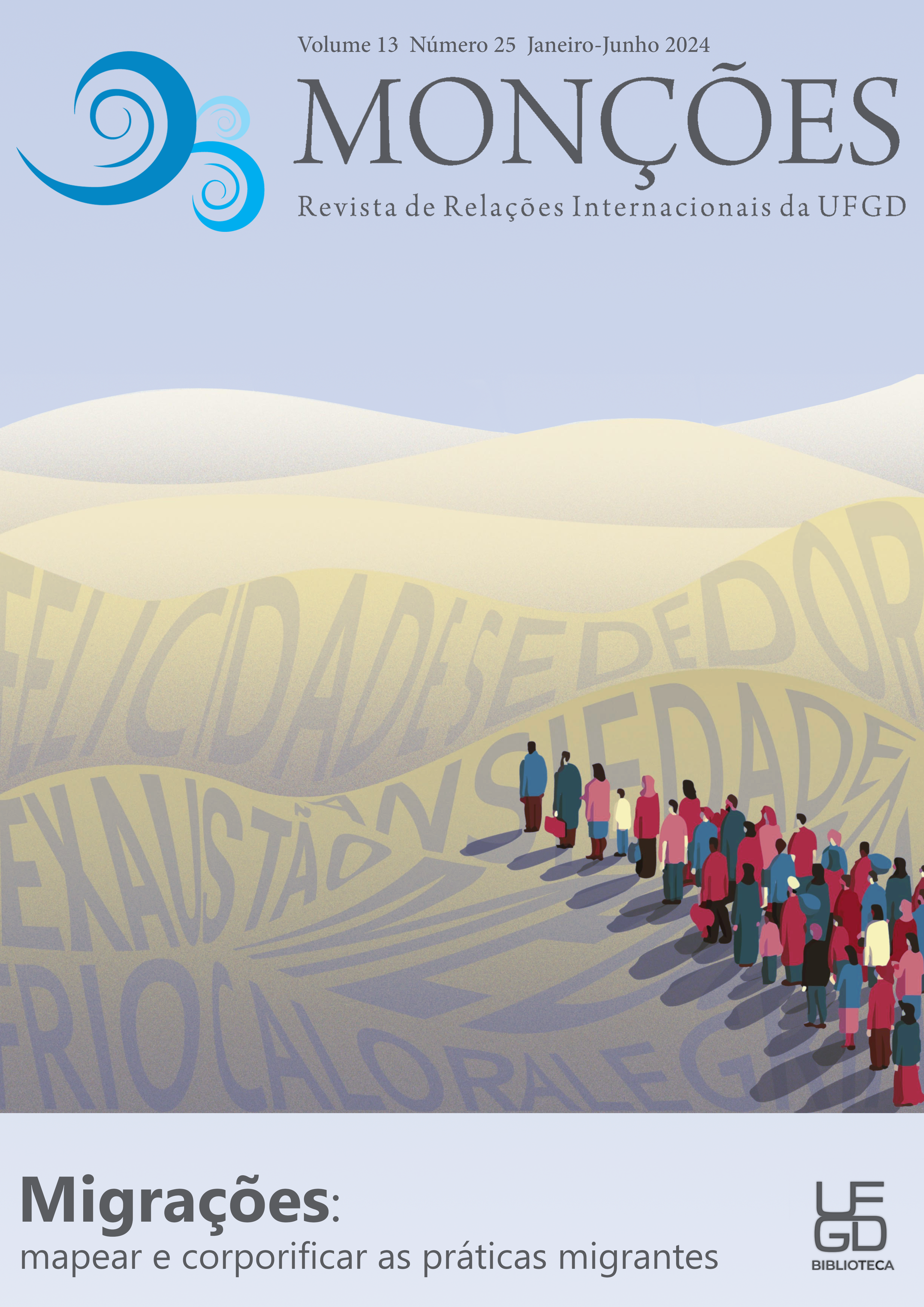Border narratives: Discursive landscapes of Venezuelan immigration in Brazil
DOI:
https://doi.org/10.30612/rmufgd.v13i25.17242Keywords:
discursive landscapes, Venezuelan migrationAbstract
In this paper we answer the interdisciplinary call to map migrant practices, recruiting the notion of discursive landscapes. We observe the discourses on/about the circulation and presence of Venezuelan asylum-seekers in the cities of Boa Vista and Pacaraima, Roraima. The data were a product of fieldwork and qualitative interviews recorded in the region between 2018 and 2019. Specifically, we focus on oral narratives produced by the social actors involved in the phenomenon – asylum-seekers, inhabitants of Roraima, governmental and non-governmental administrators. The analyses, based on a qualitative and interpretative, discursive orientation, shed light on the way in which the subjects narratively construct the border, organizing the social world that surrounds them and the circulating discourses.
Downloads
References
BAKHTIN, M. Questões de literatura e de estética: a teoria do romance. São Paulo: Hucitec; Annablume, 2002.
BAMBERG. M. Positioning Between Structure and Performance. Journal of Narrative and Life History, v. 7, n. 1, p. 335-342, 1997. DOI: https://doi.org/10.1075/jnlh.7.1-4.42pos
BLOMMAERT, J. Ethnography, Superdiversity and Linguistic Landscapes. Chronicles of Complexity. Bristol: Multilingual Matters, 2013. DOI: https://doi.org/10.21832/9781783090419
BRUNER, J. Acts of meaning. Harvard University Press, 1990.
BUTLER, J. Problemas de gênero: feminismo e subversão da identidade. Rio de Janeiro: Civilização Brasileira, 1990.
CLIFFORD, J.; MARCUS, G. (org.). A escrita da cultura: poética e política da etnografia. Rio de Janeiro: EDUERJ, 2016.
DE FINA, A. Doing Narrative Analysis from a Narratives-as-Practices Perspective. Narrative Inquiry, v. 31, n. 3, p. 49-71, 2020. DOI: https://doi.org/10.1075/ni.20067.def
DUCROT, O. O dizer e o dito. Campinas: Pontes, 1987.
FOUCAULT, M. A arqueologia do saber. Rio de Janeiro: Forense Universitária, 1997.
FOUCAULT, M. Power/knowledge. Selected interviews and other writings. New York: Pantheon, 1980.
GOFFMAN, E. A representação do eu na vida cotidiana. Petrópolis: Vozes, 1985.
GORTER, D. (org). Linguistic Landscape: A New Approach to Multilingualism. Clevedon: Multilingual Matters, 2006. DOI: https://doi.org/10.21832/9781853599170
HARRELL-BOND, Barbara. Can Humanitarian Work with Refugees Be Humane? Human Rights Quarterly, v. 24, p. 51-85, 2002. DOI: https://doi.org/10.1353/hrq.2002.0011
LABOV, W. The transformation of experience in narrative syntax. In: LABOV, W. Language in the inner city. Philadelphia: University of Philadelphia Press, 1972. p. 354-397.
LANETTE, C. Visual Depictions of Refugee Camps: constructing Notions of Refugee-ness? In: PRANEE, L. (org.), Handbook of Research Methods in Health Social Sciences. Singapute: Springer Singapore, 2019. p. 1811-1828. DOI: https://doi.org/10.1007/978-981-10-5251-4_47
LINDE, C. Life stories: The creation of coherence. Oxford: OUP, 1993. DOI: https://doi.org/10.1093/oso/9780195073720.001.0001
POLKINGHORNE, D. Narrative knowing and the human science. New York: New York Press, 1988.
SHOHAMY, E.; GORTER, D. (org.). Linguistic landscape: expanding the scenery. London: Routledge, 2009. DOI: https://doi.org/10.4324/9780203930960
WORTHAM, S. Narratives in Action. New York: Teachers College Press, 2001.
Downloads
Published
How to Cite
Issue
Section
License
- Os autores e autoras mantêm os direitos autorais e concedem à revista o direito de primeira publicação, com o trabalho simultaneamente licenciado sob a Creative Commons Atribuição-NãoComercial-CompartilhaIgual 3.0 Brasil. que permite o compartilhamento do trabalho com reconhecimento da autoria e publicação inicial nesta revista.
- Autores e autoras têm autorização para assumir contratos adicionais separadamente, para distribuição não-exclusiva da versão do trabalho publicada nesta revista (ex.: publicar em repositório institucional ou como capítulo de livro), com reconhecimento de autoria e publicação inicial nesta revista.
- Autores e autoras têm permissão e são estimulados a publicar e distribuir seu trabalho online (ex.: em repositórios institucionais ou na sua página pessoal) a qualquer ponto antes ou durante o processo editorial, já que isso pode gerar alterações produtivas, bem como aumentar o impacto e a citação do trabalho publicado, porém invariavelmente com o reconhecimento de autoria e publicação inicial nesta revista.


